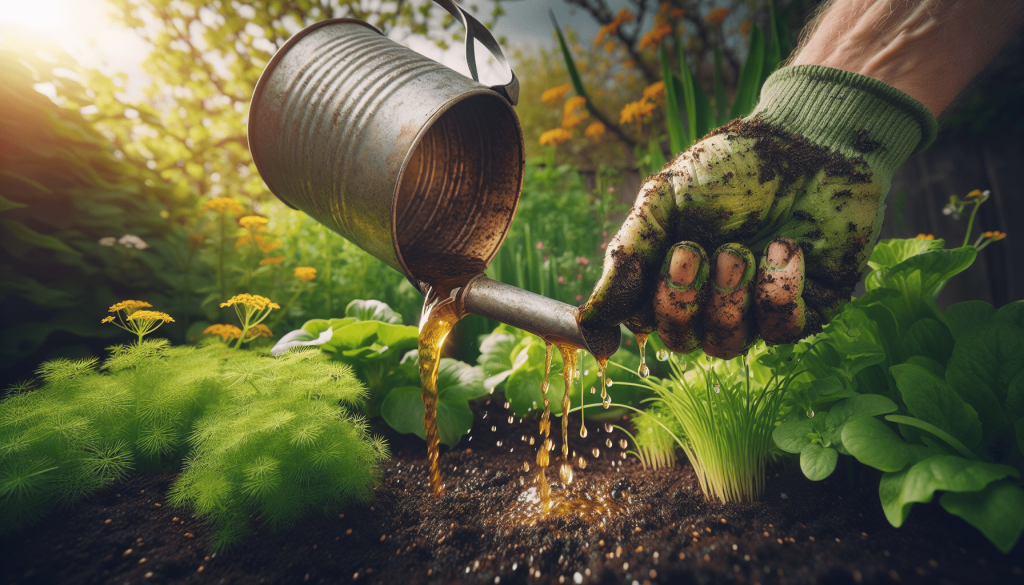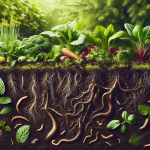This post may contain affiliate links. As an Amazon Associate, we may earn commissions from qualifying purchases.
Ready to give your garden an impressive boost? In the article “How Can I Effectively Use Compost Tea In My Garden?”, you’ll learn all about the wonders of compost tea and how it can transform your plants. By nurturing your garden with this nutrient-rich brew, you can enhance soil health, improve plant growth, and ward off pests naturally. Discover the simple steps to make your own compost tea, the best ways to apply it, and tips to maximize its benefits. Your garden will thank you! Have you ever wondered how you can make your garden thrive without resorting to harsh chemicals? If so, you’re not alone. Many gardening enthusiasts are turning to natural solutions to enrich their gardens. One of the most effective methods is using compost tea. But how can you effectively use compost tea in your garden? Let’s dig in and explore this fantastic gardening tool together.

Understanding Compost Tea
Before diving into how to use compost tea, it’s essential to understand what it is. Compost tea is a liquid solution made from steeping compost in water. This brew extracts beneficial microbes, nutrients, and soluble organic matter that can work wonders for your plants. It’s often referred to as “liquid gold” because of the incredible benefits it provides.
What is Compost Tea?
Compost tea is essentially a brewed solution that captures all the beneficial aspects of compost in a liquid form. By steeping compost in water, you create an elixir full of nutrients and beneficial microorganisms that can be directly applied to your plants.
Benefits of Compost Tea
- Improves Soil Health: Compost tea enhances the microbial life in the soil, fostering a healthier environment for plants to grow.
- Boosts Plant Immunity: It helps plants develop stronger resistance to diseases and pests.
- Provides Nutrients: Packed with essential nutrients, it acts as an excellent organic fertilizer.
- Aids Root Development: Compost tea promotes robust root systems, helping plants absorb nutrients more efficiently.
How to Make Compost Tea
Making compost tea may sound complicated, but it’s easier than you think. Here’s a simple guide to get you started.
Ingredients
To make compost tea, you’ll need a few basic ingredients:
| Ingredient | Purpose |
|---|---|
| High-quality compost | Source of nutrients |
| Water | Medium for extraction |
| Molasses (optional) | Food for microorganisms |
| Bucket | Container for brewing |
| Aerator (optional) | Increases oxygen levels |
Step-by-Step Process
- Choose the Right Compost: Quality compost is key. Ensure it’s fully decomposed and free from contaminants.
- Add Water: Fill a bucket with non-chlorinated water. Chlorine can kill beneficial microbes, so it’s best to use rainwater or let tap water sit out for 24 hours to dechlorinate.
- Mix in Compost: Use a ratio of about 1 part compost to 5-10 parts water.
- Optional Ingredients: Adding molasses helps feed the microbes. Use about 1-2 tablespoons per gallon of water.
- Aeration: Aerating your mix can significantly boost the effectiveness. An aquarium pump and airstone work well for this.
- Brewing Time: Let the mixture steep for 24-48 hours. Stir occasionally if you’re not using an aerator.
- Strain and Use: After brewing, strain the liquid through a fine mesh to remove solid particles.
How to Apply Compost Tea in Your Garden
Now that you’ve brewed your compost tea, it’s time to use it. Here’s how you can effectively apply it to your garden.
Foliar Spray vs. Soil Drench
There are two primary ways to apply compost tea: foliar spray and soil drench. Each method has its benefits, and you might want to use both for maximum effectiveness.
-
Foliar Spray: This involves spraying the compost tea directly onto the leaves of your plants. It’s effective because:
- Quick Nutrient Absorption: Leaves can quickly absorb the nutrients, providing almost immediate benefits.
- Pest and Disease Control: The beneficial microbes can outcompete pathogens, reducing disease and pest issues.
-
Soil Drench: Pouring the compost tea into the soil around your plants’ root zone. This method:
- Enhances Soil Microbiology: Promotes a healthy microbial balance in the soil.
- Encourages Root Development: Helps plants develop more extensive and healthier root systems.
Best Times to Apply Compost Tea
Timing is key when applying compost tea. Here are some tips on when to use it for the best results:
- Morning or Evening: Apply during cooler parts of the day to reduce evaporation and leaf burn for foliar sprays.
- Regular Schedule: Applying compost tea every 2-4 weeks throughout the growing season can keep your plants consistently healthy.
- During Stress Periods: Use compost tea during times of plant stress, like after transplanting or during drought conditions, to help them recover.
Tips for Maximizing Compost Tea Benefits
By following these additional tips, you can get the most out of your compost tea applications.
Choose Quality Compost
Remember, the quality of your compost tea hinges on the quality of the compost you use. Avoid using compost that hasn’t fully decomposed or is sourced from potentially harmful materials.
Aerate for Richer Results
If possible, always aerate your compost tea. Aeration increases the levels of beneficial microorganisms, making the tea more potent and effective. If an aerator is not an option, frequent stirring can help introduce some oxygen into the brew.
Avoid Contamination
Using clean equipment and ensuring that your compost doesn’t contain harmful pathogens can prevent contamination. Pathogens in your compost can be detrimental to your plants and garden ecosystem.
Use Fresh Tea
Compost tea is most effective when used fresh, within a few days of brewing. The beneficial microbes can quickly decline if the tea sits too long.

Common Questions About Compost Tea
Many gardeners have similar questions when they start using compost tea. Here are some answers to the most commonly asked questions.
Can I Use Too Much Compost Tea?
Using compost tea excessively is not generally harmful, but it’s also not necessary. Overuse doesn’t typically result in better outcomes, and it might waste your hard work and resources.
How Do I Know My Compost Tea is Working?
Healthy plants are the best indicators. You should notice stronger, more vibrant growth, fewer pest issues, and an overall healthier garden. Additionally, your soil should start to look richer and more fertile over time.
What Type of Compost is Best?
All compost types can be used, but those rich in diverse organic matter and free of contaminants are ideal. Well-balanced compost made from green and brown materials will usually yield the best results.
Can I Make Compost Tea Without Aeration?
Yes, you can, but an aerated tea is more effective. If you opt for a non-aerated method, be diligent in stirring your mixture frequently.
Troubleshooting Compost Tea Problems
Sometimes, things don’t go as planned. Here are common problems and how to fix them.
Bad Odor
If your compost tea smells bad, something probably went wrong. Properly brewed compost tea should smell earthy and pleasant. A foul smell usually indicates anaerobic conditions or contamination.
Solution: Try using an aerator, and ensure the compost you use is from a healthy source. If the smell persists, discard the batch and start again using clean equipment.
Ineffectiveness
If you don’t see any improvement in your plants, it could be due to poor compost quality or improper brewing techniques.
Solution: Reassess your compost source. Ensure you’re using a high-quality, well-decomposed compost. Pay attention to your brewing technique and consider aerating your tea for better results.
Enhancing Compost Tea with Other Natural Remedies
To further enhance your gardening experience, you can integrate other natural remedies with your compost tea.
Companion Planting
Pairing plants that benefit each other can maximize your compost tea’s effectiveness. For example, planting legumes helps fix nitrogen in the soil, which complements the nutrient boost from your compost tea.
Mulching
Using organic mulch helps retain moisture and improve soil structure, working hand-in-hand with the microbial life promoted by compost tea.
Organic Fertilizers
While compost tea is rich in nutrients, sometimes specific amendments are necessary. Organic fertilizers, like bone meal or fish emulsion, can target nutrient deficiencies for even healthier plants.
Final Thoughts
Compost tea can be a game-changer for your garden. By understanding what compost tea is, how to make it, and the best ways to apply it, you can significantly improve your soil health and plant vitality. Remember, quality compost and proper brewing techniques are key to maximizing the benefits of this liquid gold. So why not give it a try? Your garden will thank you.







